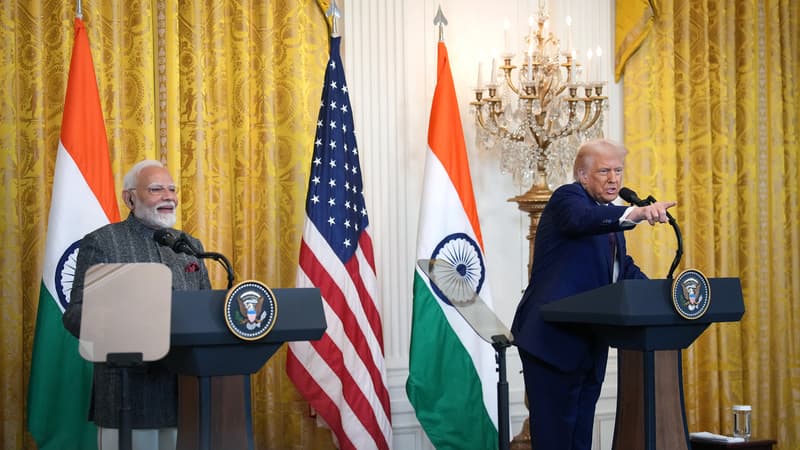President Donald Trump announced on his social social platform that Indian products will be the subject of 25% of customs duties upon arrival in the United States from August 1, adding that a “penalty” will be added for the purchase of Russian oil.
“We have a mass commercial deficit with India!” He underlined the White House tenant.
But India also “bought most of Russia’s military team and are the main customers of Russian oil with China, while everyone wants Russia to stop killing in Ukraine.”
A situation that justifies, in the eyes of the US president, “a penalty”, which will be added to 25%, without further specifications, and that will also intervene from August 1.
New Delhi does not yield
This new price imposed on Indian products represents a symbolic fall at a percentage point compared to 26% initially presented in early April, on the occasion of the announcement of customs tasks presented incorrectly as “reciprocal” by Donald Trump.
On Tuesday, the US president had already given an index by emphasizing that customs duties in “Made in India” products could be between 20 and 25%, and added, however, that an agreement was still possible.
New Delhi and Washington have launched negotiations for several months with a view to a commercial agreement, without results so far, in particular not wanting to open their market completely to US agricultural products.
But until now India has not given way. Unlike the United Kingdom, Japan or the EU, which seem to undergo the will of US president, Narendra Modi is inflexible to him. Indian exports to the United States represent only a small part of their economy, even if it amounts to $ 87.4 billion according to the United States government. And New Delhi does not want to soften his barriers at the entrance, particularly opening his agricultural sector to US companies. New Delhi favors his national interest above all.
“India could give a little, but the possibilities of this happening are not very large, because the red lines of India are very clear in agriculture, in particular the genetically modified products of food and dairy products, there is no possibility of returning,” said CNBC Jayant Dasgupta, former Indian ambassador to the commercial world organization.
Main Russian oil client
The other point that bothers Washington is the purchase of oil from Russia. In which there is still India does not intend to go back.
“Where we need clarity, this is this penalty. Is it a threat, if India continues to import Russian oil, we will surprise a penalty? And in certain products or all?” The general director of the Indian Federation of Export Organizations, Ajay Sahai.
In fact, India is one of the main customers of Russian oil, however, under sanction, but a blessing from the point of view of New Delhi, which benefits from a lower purchase price, while Moscow seeks to finance its war effort in Ukraine.
However, the US president has hardened the tone in recent days, frustrated by the lack of progress by a possible peace agreement between Russia and Ukraine, and increasingly accusing his Russian counterpart, Vladimir Putin, of not trying to put an end to the conflict.
Donald Trump now threatens countries that buy Russian, but also Iranian oil, of “secondary” sanctions, which would take the form of additional customs duties about products from these countries.
China and India are among the first Russian oil buyers.
In the process, Donald Trump announced an agreement with Pakistan to “develop his immense oil reserves”, without further precision, and added that “they may sell oil to India one day!”
Strategic to frustrate China
Last point finally in favor of India: the country is known in a strategic position in the region to frustrate Chinese domination.
“From a strategic point of view, the United States has little interest in alienating India. They consider that it is a solid partner, capable of shaping the indopacific landscape,” said Harsh V. Pant, vice president of foreign studies and policies to observe the IT investigation base.
The United States has made China the main opponent of the world and the White House has understood that the rise of India frustrated Beijing. While more and more companies move their production from China to India (starting with Apple, which is now making more iPhone than in China for the US market), the United States is thinking more about the value chains in India of what you can do in China. And this to finally repatriate factories to the United States.
As a reminder, the customs duties announced in early April by the US President had been postponed for the first time of 90 days until early July, before a new postponement until August 1.
According to Donald Trump, it was about giving time to trade negotiations, the White House ensuring that dozens of agreements are signed during the truce period.
Until now, only six agreements have been announced, in particular with respect to the main commercial partners in the United States, the European Union (EU), the United Kingdom and Japan, which, therefore, will see their products taxed up to 15%.
Washington has also announced agreements with the Philippines, Vietnam and Indonesia.
Source: BFM TV


